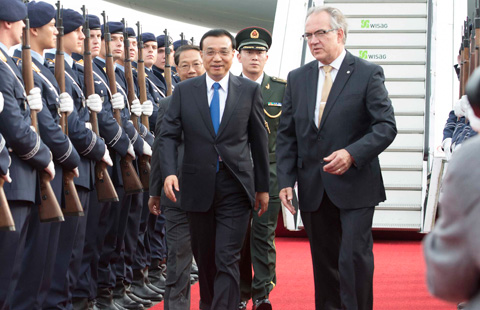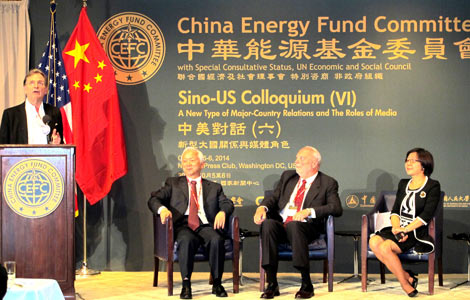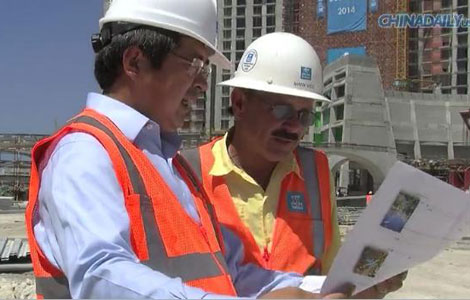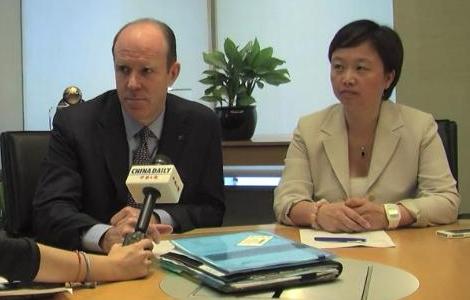A lifetime of keeping an eye on China
Updated: 2014-09-12 12:16
By Chen Weihua in Washington(China Daily USA)
|
||||||||
Independent Brookings
So when he was approached by the Brookings Institution in 2010, Pollack was thrilled.
"It really represents a very different opportunity for me, in a sense I never worked in Washington before. But the great appeal of Brookings is its unambiguous independence," Pollack said. "We try as much as we can to stand apart from the government."
At Brookings, Pollack continues his focus on critical strategic questions, he is happier to be able to detach himself from a direct focus on very military specific issues.
"I always try to see intellectual puzzles," said Pollack, saying that he has continued to spend time to study North Korea, a place he developed an interest in at Harvard and later at Rand.
"Because we still have to more or less study North Korea the way I used to study China 30 or more years ago," he said.
Pollack's 2011 book No Exit: North Korea, Nuclear Weapons, and International Security, in which he discusses the Korean Peninsula since 1945, the various scenarios and China's role, has won rave reviews.
He has traveled a lot to Asia and in particular China to share his view on US-China relations and the Korean Peninsula.
Like most China watchers in the United States, Pollack is concerned about the current status of bilateral relations between the world's two largest economies.
Xi-Obama talk
Despite the two way traffic flow of senior officials including the one made this week by National Security Advisor Susan Rice, Pollack said the relationship remains troubled across a wide array of political, economic and security issues.
"The expectations for developing a 'new model of major power relations' expressed by both presidents at the Sunnylands summit in June 2013 and still regularly enunciated by Chinese officials are now far more cautionary," he said.
While US President Barack Obama is expected to visit China on Nov 12 after attending a two-day APEC summit in Beijing, Pollack cautioned that is the time when Obama enters his final two years in office and the US presidential campaign will have begun in earnest.
Many China watchers are wary of the cyclic China bashing rhetoric among US politicians during campaign years.
Pollack believes the challenge for the discussions in Beijing must be to establish a sound and realistic policy agenda for the remainder of President Obama's term.
"Though bilateral relations are not in a free fall, neither leader should take much satisfaction from the prevailing state of affairs," he said.
"There are regular calls for enhanced cooperation, but what will be the content of such cooperation? What are the mutual obligations that the two presidents undertake to advance complementary goals? Equally important, can tangible progress in managing bilateral differences diminish the strategic suspicions regularly voiced by commentators and in the mass media of both countries?" Pollack asked.
Pollack believes the agenda for the discussions between Xi and Obama will need to encompass a wide array of issues, including hopes to reenergize the negotiations of a bilateral investment treaty on which the prospects for longer term economic integration will depend.
Other issues regarding global security include the tensions in the Middle East, Ukraine, the South and East China seas and North Korea.
"The opportunities for candid discussion between both leaders on such pressing issues do not often occur, and must be grasped," said Pollack, now already a grandfather of six.
chenweihua@chinadailyusa.com
Most Viewed
Editor's Picks

|

|

|

|

|

|
Today's Top News
Premier pushes innovation on German visit
Beijing to keep the lid on air pollution for APEC
Li arrives in Germany, first leg of Europe trip
China's economy surpasses US
IMF: Shadow banking filling gaps
China's status prominent at 'Big Four' firm Ernst & Young
US Ebola patient dies
China's role grows in Gates Foundation tech push
US Weekly

|

|
















